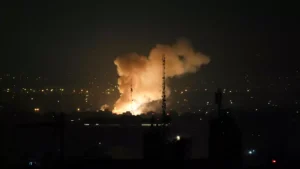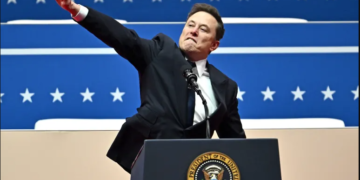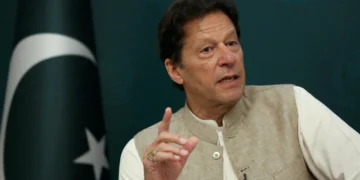Israel’s Operation longstanding Israel vs Iran conflict has entered a new and volatile chapter with Israel’s recent military operation, dubbed Operation Rising Lion. This offensive primarily focuses on neutralizing Iran’s nuclear ambitions and its military infrastructure. As tensions continue to rise between the two countries, the question of how such a conflict could unfold has garnered global attention. In this article, we explore the context of the Iran vs Israel conflict, the specifics of Operation Rising Lion, and the broader implications for regional stability.
Overview: Understanding the Israel vs Iran Conflict
The Israel vs Iran conflict is rooted in a complex history of ideological, political, and military differences. At the core of the discord is Israel’s suspicion of Iran’s nuclear ambitions. Israel perceives Iran’s nuclear program as a direct existential threat, given Iran’s vocal opposition to Israel’s right to exist and its support for groups like Hezbollah and Hamas that are hostile toward Israel.
Israel’s Operation the tensions between the two nations have steadily escalated over the years, marked by proxy battles, cyber warfare, and direct military strikes. As the Iran vs Israel conflict deepens, questions about the military capabilities of each side—Israel military vs Iran military—and the potential outcomes of an all-out war have taken center stage. These concerns have been heightened with operations like Operation Rising Lion, which seeks to disable Iran’s nuclear and military infrastructure.
Detailed Section: The Rise of Operation Rising Lion
Israel’s Operation Rising Lion is a highly strategic and calculated military response to Iran’s growing influence in the region, particularly its nuclear program. This operation aims to take out Iran’s key nuclear facilities and military assets that could be used in regional destabilization efforts. The scope of the operation, while highly classified, has already seen multiple airstrikes on Iranian military sites in Syria and Iraq, targeting arms shipments to Hezbollah and other Iranian-backed militias.
The Nuclear Threat
Israel’s primary concern is Iran’s nuclear program, which Israel believes could lead to the development of nuclear weapons. This threat has been a significant driving force behind Israel’s military strategy in the Iran vs Israel conflict. Israeli officials argue that Iran’s nuclear ambitions, coupled with its anti-Israel rhetoric, make it a dangerous adversary. Israel’s Operation has consistently warned the international community about the dangers of a nuclear-armed Iran and has taken preemptive actions to delay Iran’s progress in this area.
Operation Rising Lion has reportedly targeted key nuclear facilities, including enrichment plants and missile silos, as well as Iran’s ballistic missile capabilities. This approach is intended to weaken Iran’s nuclear deterrent and halt its plans to potentially develop weapons of mass destruction.
The Military Dimensions of the Conflict
In addition to the nuclear threat, the Israel military vs Iran military dynamic is a significant component of the operation. Israel’s Operation particularly its Air Force, is considered one of the most advanced and powerful in the Middle East. Iran, on the other hand, boasts a large and diverse military, including an extensive network of proxy forces and militias spread throughout the region.
While Iran army vs Israel presents a substantial challenge, Israel’s technological superiority, especially in intelligence, surveillance, and air capabilities, gives it a distinct edge in an open conflict. The war Israel vs Iran would likely see extensive air and missile strikes, with both sides leveraging advanced technology to outmaneuver each other.
Proxy Wars and Regional Impact
One of the defining characteristics of the guerra Iran vs Israel is the use of proxy forces. Iran has invested heavily in supporting groups like Hezbollah, Hamas, and various militia factions throughout the Middle East. These groups often carry out attacks against Israeli targets, acting as Iran’s military proxies. Israel, in turn, has conducted numerous strikes against these groups, both in Lebanon and Syria, to prevent them from establishing stronger footholds near Israel’s borders.
The broader regional instability caused by the Iran vs Israel conflict extends beyond just these two countries, impacting neighboring states such as Syria, Iraq, Lebanon, and even the Gulf States. The involvement of regional powers like Saudi Arabia and the UAE, who view Iran as a regional rival, has also complicated matters, leading to an arms race and shifting alliances.
Benefits: The Strategic Calculus of Operation Rising Lion
While the ramifications of Operation Rising Lion are still unfolding, the operation carries several strategic benefits for Israel. These include:
Preventing Nuclear Proliferation
Israel’s Operation the primary benefit of Operation Rising Lion is its potential to delay or prevent Iran from acquiring nuclear weapons. Israel’s actions are aimed at curbing Iran’s nuclear capabilities, which are seen as a direct threat to Israel’s security. By targeting Iran’s nuclear infrastructure, Israel hopes to ensure that Iran is unable to develop a nuclear arsenal that could shift the regional balance of power.
Securing Regional Stability
By attacking Iran’s military infrastructure, Israel seeks to prevent further Iranian military expansion in the Middle East. This includes curtailing Iran’s support for proxy groups that threaten Israel’s security and regional stability. The operation is designed to weaken Iran’s military reach and reduce its ability to project power in countries like Syria and Iraq.
Strengthening Israel’s Deterrence
Israel’s military superiority has long acted as a deterrent against potential adversaries. The success of Operation Rising Lion would reinforce Israel’s position as the dominant military power in the region, making it clear that Israel is willing and capable of defending itself against any threat, including that posed by Iran.
International Attention and Support
While Israel faces criticism for its military actions, especially regarding the humanitarian consequences of its operations, these actions also garner international attention. Some countries, particularly in the West, support Israel’s right to defend itself against Iran’s nuclear ambitions. This support strengthens Israel’s global standing, particularly in its diplomatic relations with countries like the United States.
FAQs Section
- What started the Iran vs Israel conflict?
The roots of the Iran vs Israel conflict date back to the Islamic Revolution of 1979 when Iran became an Islamic republic and cut ties with Israel. Prior to the revolution, Iran and Israel maintained relatively good relations, but the new Iranian government, led by Ayatollah Khomeini, rejected Israel’s right to exist and has supported anti-Israel groups in the region ever since.
- Who is more powerful in the Iran vs Israel conflict?
The question of Iran vs Israel who is more powerful depends on the criteria used. Militarily, Israel is considered to have a technological edge, especially in air power and intelligence. However, Iran has a larger population and a more extensive army. Which combined with its network of regional proxies, makes it a formidable adversary.
- What is Operation Rising Lion targeting?
Operation Rising Lion primarily targets Iran’s nuclear infrastructure and military assets. Israel is focused on neutralizing Iran’s nuclear capabilities and its support for proxy groups that threaten Israel’s security.
- Could Israel win in a war against Iran?
The question of who would win in a war Israel vs Iran is highly speculative. While Israel’s military is technologically superior. Iran’s larger army, its proxy forces, and its strategic position in the region make it a formidable opponent. A war between the two would likely be devastating for both sides and could destabilize the entire Middle East.
- How does the Iran army vs Israel compare?
Israel’s Operation the Iran army vs Israel presents a complex military landscape. Israel’s military is technologically advanced, with superior air and missile defense systems. While Iran has a large and diverse military, with significant regional influence through its proxy forces.
Final Thoughts: The Future of the Israel vs Iran Conflict
The Israel vs Iran conflict is far from over, and Operation Rising Lion marks just another chapter in a longstanding rivalry. While Israel’s military operations aim to secure its future by neutralizing the Iranian threat, the consequences of these actions are still unfolding. The question of who would win in a war Israel vs Iran remains uncertain, but one thing is clear: the tensions between these two nations will continue to shape the geopolitical landscape of the Middle East for years to come.
As the conflict intensifies, the international community will likely play an increasingly important role in either de-escalating or exacerbating tensions. Ultimately, the path forward for both nations—whether through diplomacy or continued military engagements—will significantly impact not just the Middle East, but the global order as well.






































